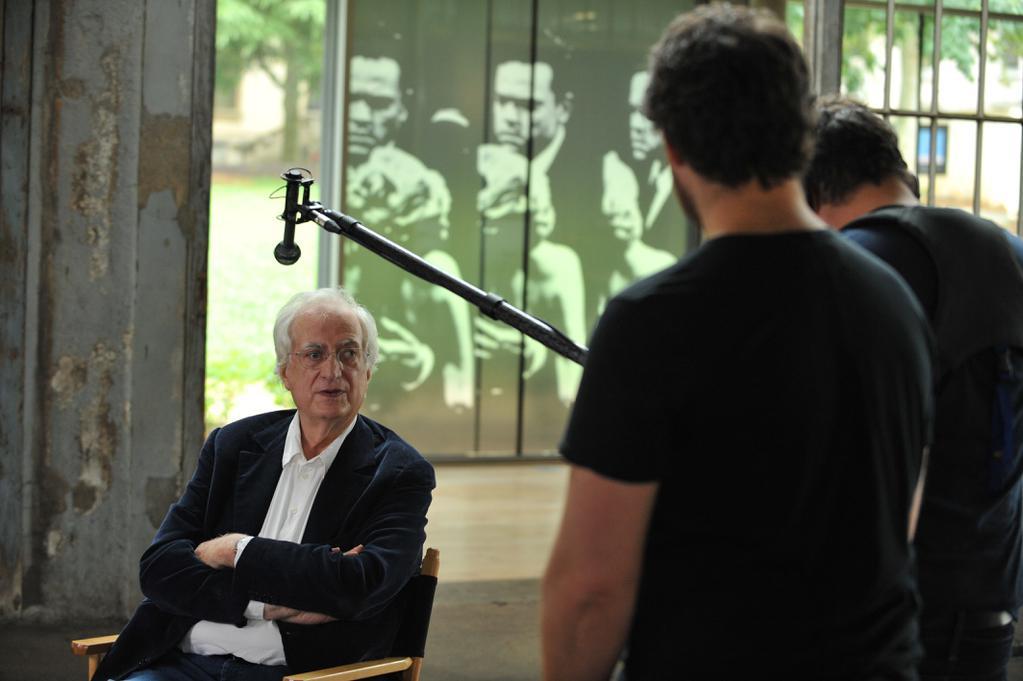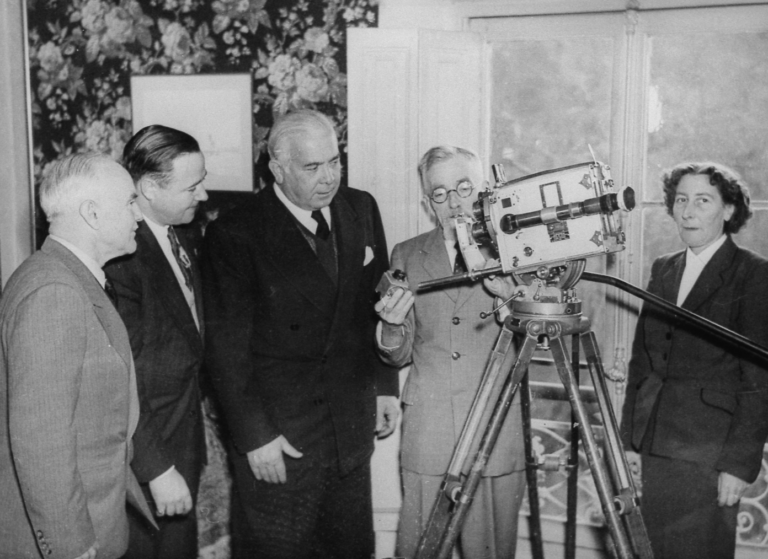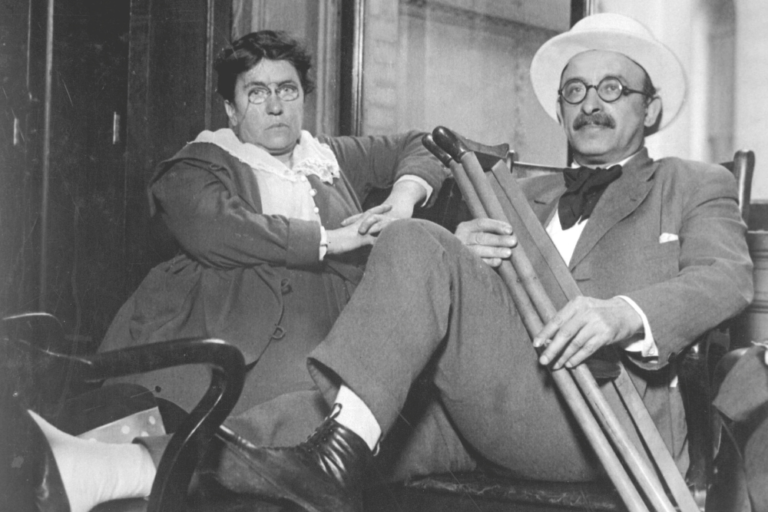
Bertrand Tavernier, A Remembrance

© Etienne George (Little Bear/Pathé Production) - Courtesy of Unifrance
By Taylor Hackford
Director and movie lover—or perhaps was it the other way around—Bertrand Tavernier died on March 25, 2021. American filmmaker Taylor Hackford remembers his friend and their fiery debates on the seventh art, youth, and moral dilemmas. The depiction he gives of his work is that of an inexhaustible defender of justice, whose influence will radiate for the generations to come.
Bertrand Tavernier: student protester, acolyte of Jean Pierre Melville, French publicist for American movies, film historian-critic-essayist, and successful feature film director… Bertrand had played all of these roles before I met him in the late 1980s. We came together at a colloquium in Los Angeles, a meeting of American and French filmmakers that was supposed to be harmless cultural exchange, but soon turned into a melee over American cultural imperialism—the French filmmakers protesting against American film studios dominating the movie screens of Europe. Although Bertrand supported his countrymen, he was a bit embarrassed because of his consummate love affair with American cinema.
I felt the same emotional discomfort, having devoured every French New Wave movie I could find in LA’s ‘Art House’ cinemas in the ‘60s. When he told me that one of his first jobs was working for Jean Pierre Melville, one of my all-time favorite directors, I took him to my local dive bar and we talked for hours. I was amazed when he said he knew about my first full-length documentary, Bukowski, on the great LA poet, and I was equally chuffed when he asked to see it. His insights about that film were probably the most incisive I’ve even received. We became friends and stayed in touch for the next 30+ years.
The 1968 general strike in France was perhaps the defining moment for Bertrand’s psyche. It was always a reference point in our conversations. In fact, that momentous year was a flashpoint all over the world: in Prague, Chile, China, and here in the US, where cities burned and students violently challenged traditional institutions, just like in Paris. Bertrand spent his life and career investigating and critiquing the social institutions those protests were attempting to dismantle. His focus was always on justice and how economic power and politics impact the institutions of justice. Certainly, his first three films, The Clockmaker of St Paul, Let Joy Reign Supreme, and The Judge and the Assassin, all reveal this obsession, even though they are set in different historical periods—his point was that power always corrupts.
Bertrand discovered the perfect dramatic vessel to deliver his social critiques: the incomparable, Philippe Noiret, whom he collaborated with over and over again. I believe this was one of the most potent creative collaborations in the annals of cinema. Of course, neither Tavernier nor Noiret were often described as explosive—their power was subtle—but the intellectual sparks they created could sneak up and burn you.
Bertrand was also obsessed by World War I, the “forgotten war,” and made two of his best films about that senseless travesty of justice. Life and Nothing But, again with Noiret, is a searing indictment of the human price of war, and Captain Conan, with the magnificent Philippe Torreton, is, to me, nothing less than a masterpiece—putting the military’s craven savagery under a microscope and revealing the psychological toll of legalized violence.
Finally, my favorite Tavernier film is Coup de Torchon. Again, he delivered a caustic critique of another French institution, colonialism, but this time Bertrand came up with a master stroke, choosing as his source material American pulp novelist Jim Thompson’s Pop. 1280, and then transposing the location of the story from the segregationist Mississippi to French West Africa— a truly brilliant adaptation. Also, he gave Philippe Noiret perhaps is greatest role—the morally bankrupt colonial policeman who is disrespected and abused by everyone, until he finally has the last laugh. This is what great cinema is all about: a talented director with a unique vision.Our meetings were not always in Los Angeles; I also had the fortune to meet with Bertrand in his hometown, Lyon. Anyone who has sampled the cuisine of Lyon knows this city is a high point of French cooking. Our conversations were always exhaustive, and sometimes contentious— Bertrand was passionate about cinema, and he could be merciless when you disagreed with him—but over a meal in Lyon, these arguments always ended up in an embrace.
Bertrand was always jumping into moral disputes. Just before he died, he wrote me about a controversy at the University of Wisconsin having to do with Fredric March, the great American actor. March was an alumnus of the university and had given money to his alma mater to establish an experimental theater on campus that bore his name. Back when he was a student, he was extremely accomplished and popular on campus and in his senior year, he was tapped by many prestigious honor societies. He accepted membership in many of them and graduated with honors. After college, Fredric March went on to illustrious careers on the stage in New York and on screen in Hollywood, and was well known as a major supporter of liberal/left causes. He was good friends with Paul Robson, and joined him in civil rights events that were risky to his career during the bitter anti-communist era.
However, it was recently discovered that one of the honor societies that March joined as a student had subsequently established ties with the Ku Klux Klan. When contemporary U of Wisconsin students discovered this, they demanded that his name be struck from the theater he founded on campus. Bertrand was outraged that March, a recognized liberal and civil rights supporter could be “cancelled” so easily. I pointed out that young people often react quickly and passionately—even violently—to issues they believe are morally wrong—perhaps like the French students did in the protests of 1968? He laughed and acknowledged that youthful outrage often rolls over the innocent as well as the guilty, but he was undeterred and was going to pursue this miscarriage of justice—Fredric March deserved better.
Bertrand Tavernier was a tireless campaigner for justice, and his films will live on to broadcast his righteous POV to many generations to come. I consider myself fortunate to have engaged with such a great soul and cinematic intellect.
Taylor Hackford is an American film director and former president of the Directors Guild of America. He has won numerous awards throughout his career and is most famous for his movies An Officer and a Gentleman (1982), Against All Odds (1984), Ray (2004), and the cult thriller The Devil’s Advocate (1997). He recently turned to theatre and directed a musical production, The Comedian (2016), starring Robert De Niro.

